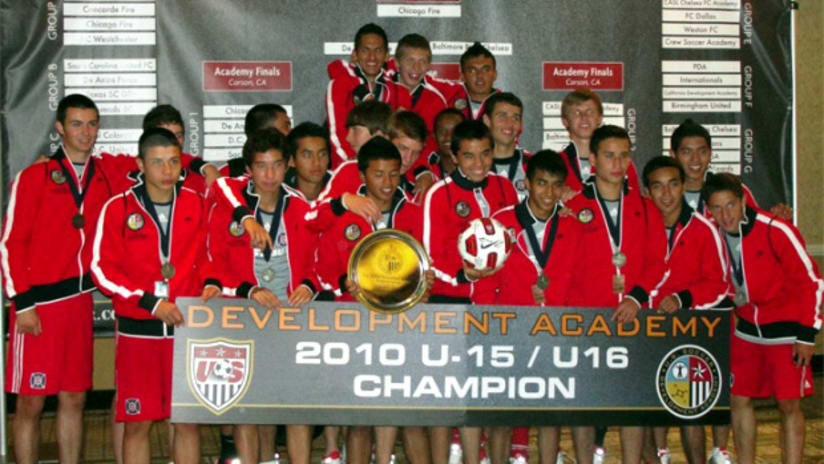BRIDGEVIEW, Ill. – According to U.S. Soccer’s website, the Development Academy was created in 2007 “to improve the everyday environment for the elite youth player.”
But how does a U.S. Soccer Developmental Academy team live up to that directive? How do you get a 15 year-old kid to buy in, to tone down their competitiveness, or to think about the game like a 35 year-old vet when he’s a sophomore in high school?
Those are all tough question to answer. If you’re the Chicago Fire, you put your money where your mouth is.
Chicago preach professionalism and then take their U-18 team to Mexico to train with the first team to show what it means to be a pro; they tell their players to dream big and build a field for them in the shadows of Toyota Park to give a visual.
Sometimes, the Fire get a reward for the hard work. Maybe it comes in the form of last-gasp goal to win a game, or maybe it takes the shape of a playoff berth. Or maybe – as was the case for the club’s U-16’s this year – it comes in the form of a national championship.
On July 16, with club owner Andrew Hauptman in the stands, the Fire’s U-16 team beat Cal Odyssey in penalty kicks to win the USSDA National Championship at the Home Depot Center. In the process, the Fire became the first MLS team to win a USSDA national title, a fitting reward for three years of hard work.
“In the third year of the academy program, to be able to win a championship of that stature…it’s certainly a huge thrill,” said Fire Director of Youth Development John Dorn. “It was just a great feeling for the kids, a great feeling for all the staff, and to have Andrew there celebrating it just like it was a championship…it was just a great, great feeling overall.”
But winning isn’t everything for the Fire’s academy teams. The club is aware of the classic critique of American youth soccer – too much emphasis on winning, not enough on development – and they’re working hard to go in the other direction. Chicago believe that technical ability and tactical awareness should come first and that winning is merely a positive byproduct of good players and good coaching.
“We’re developing [kids] to be professional players; championships and winning take a secondary nature to that,” Dorn said. “It’s about developing the players to be tactically aware and technically proficient at that level and at whatever level the next step will be”
The Fire have two main methods of preparing players to become professionals. The first is to have a consistent philosophy – something Technical Director Frank Klopas calls a “pyramid structure” – from the first team all the way down the chain.
“The most important thing is the club philosophy,” Klopas said. “We’re putting a whole manual together that details the club philosophy: how we want to play, what’s the role of the players, what are your responsibilities as a Fire player.
“If we want to play a certain style with the first team, it wouldn’t make any sense if our academy teams…didn’t do it the same way. I think we’ve worked very hard to have that understanding and philosophy.”
The second method is to preach professionalism to every academy player. The Fire understand that if their academy is to produce professionals, the kids must look at the game as a craft, something that needs to be improved every single day in order to advance to higher levels.
“They might be 16, but they’re playing with the Fire,” Dorn said. “They play for a professional team and every day we try and instill in them the thought that they’re a pro in the making. They have to conduct themselves professionally. They have to prepare both on and off the field every day for that.”
And while all of that’s good and well, the Fire know that the academy will ultimately be judged upon how many professional players they produce. If no one comes out of the program then, for all intensive purposes, it failed. It may be nice to send kids to college on scholarships, but until a Fire academy player breaks through to the first team, it means nothing to the club’s bottom line.
Chicago, however, could see an academy player break through soon. Klopas hinted that some current academy players are capable of turning pro and filling the Fire’s two “homegrown” roster slots.
“I definitely feel that there are kids in our academy that we could give those slots to,” Klopas said. “We feel confident that we might try to sign two of those kids in the homegrown slots but it’s still almost like a coin toss because [it means] bypassing an opportunity from those kids [to get] a scholarship. You got to make sure that it’s the right two players that you feel do have a great opportunity of making it.”
Sam Stejskal covers the Chicago Fire for MLSsoccer.com. He can be reached at sam.h.stejskal@gmail.com or on Twitter @samstejskal.


